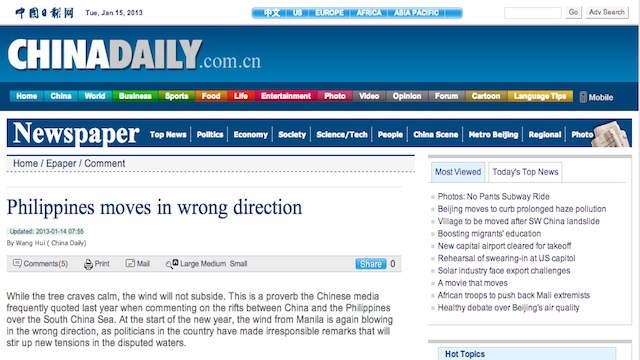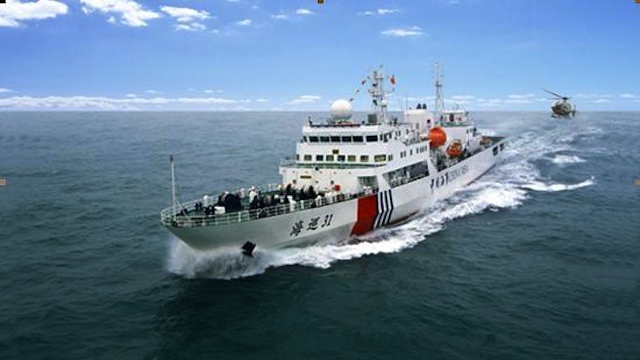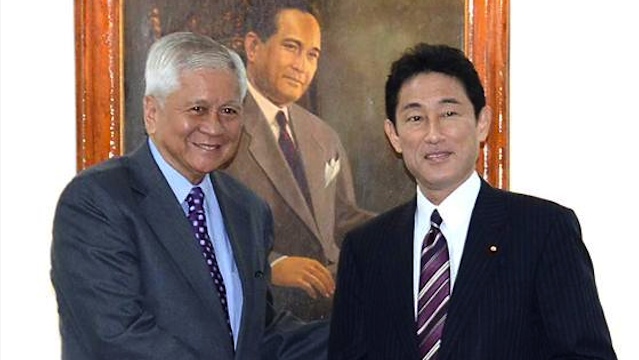SUMMARY
This is AI generated summarization, which may have errors. For context, always refer to the full article.

MANILA, Philippines – While the Department of Foreign Affairs (DFA) is still considering filing another protest to China over its new official map including South China Sea territories, China believes Philippine foreign policy is moving “in the wrong direction.”
One of Beijing’s official mouthpieces, the China Daily newspaper, published on Monday, January 14 an editorial accusing Manila politicians of making “irresponsible remarks that will stir up new tensions in the disputed waters.”
“At the start of the new year, the wind from Manila is again blowing in the wrong direction,” said the article, quoting a Chinese proverb: “While the tree craves calm, the wind will not subside.”
The newspaper also mentioned Foreign Secretary Albert del Rosario’s remarks on Wednesday, January 10, when Del Rosario suggested China’s deployment of patrol ships in the West Philippine Sea (South China Sea) would increase the tension in the area.
“This is a false accusation and Manila’s top diplomat should not forget that his own country raised the tensions in the disputed waters in the first place last year,” China Daily added.

China: Scarborough Shoal standoff caused by PH
The newspaper said that the April 2012 standoff at Scarborough Shoal was caused by “a Filipino warship [that] harassed Chinese fishermen who were fishing around Huangyan Island, which belongs to China.”
“The more frequent presence of Chinese marine surveillance ships in these waters since then has been a response to Manila’s provocative moves,” explained the Chinese official newspaper.
China Daily added that “it is a normal practice for a sovereign state to patrol its territorial waters. Instead of feeling uncomfortable about it, Manila had better get use to it.”
Regarding the possibility of building infrastructure to develop Philippine territories in the South China Sea for tourism, the newspaper stressed that said action would be considered “an open defiance to China’s sovereignty.”
“If Manila takes further steps in this regard, it is sure to meet with strong opposition as well as countermeasures from China. It is now crystal clear that Manila is determined to play the role of a troublemaker and seeks every opportunity to escalate tensions in the South China Sea,” said the China Daily.
China, however, is already planning to invest over US$1 billion to build an airport and other infrastructure on and around Sansha, the city which enforces Beijing’s policy over the South China Sea.
Sansha’s jurisdiction covers part of the Philippines’ 200-nautical-mile Exclusive Economic Zone.

Beijing angry over PH-Japan ‘strategic partnership’
Beijing’s official mouthpiece also criticized the Philippines for seeking the support of other countries — fellow ASEAN claimants Brunei, Malaysia and Vietnam as well as the US and Japan — in its row with China.
Of all of these, the Japanese “alliance” is the one which by far has irked the Chinese the most, as Japan not only still evokes the memory of its wartime past but has also locked horns with China in another dispute over the sovereignty of the Senkaku Islands in the East China Sea.
Del Rosario and Japanese foreign minister Fumio Kishida discussed last week a deal for buying 10 new patrol boats to improve the capabilities of the Philippine Coast Guard, presumably in exchange for Manila’s support on the Senkaku dispute.
In December 2012, the DFA chief supported a rearmed Japan to “balance” China.
China Daily questioned this new “strategic partnership”, especially “with Japan being involved in its own dispute with China (…) and the strong anti-Japanese sentiments in Philippine society” also stemming from abuses during World War II.
The article ended with a warning for both the Philippines and Japan: “Neither country should make strategic misjudgment and underestimate China’s determination to safeguard its territorial waters.” – Rappler.com
Add a comment
How does this make you feel?
There are no comments yet. Add your comment to start the conversation.